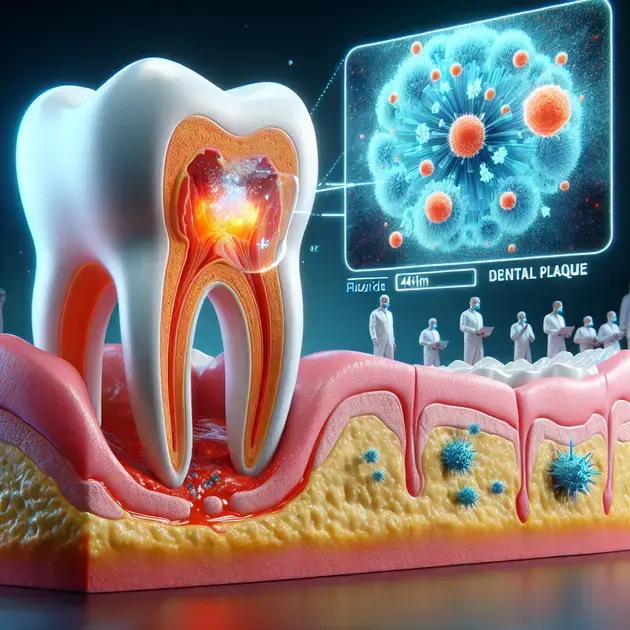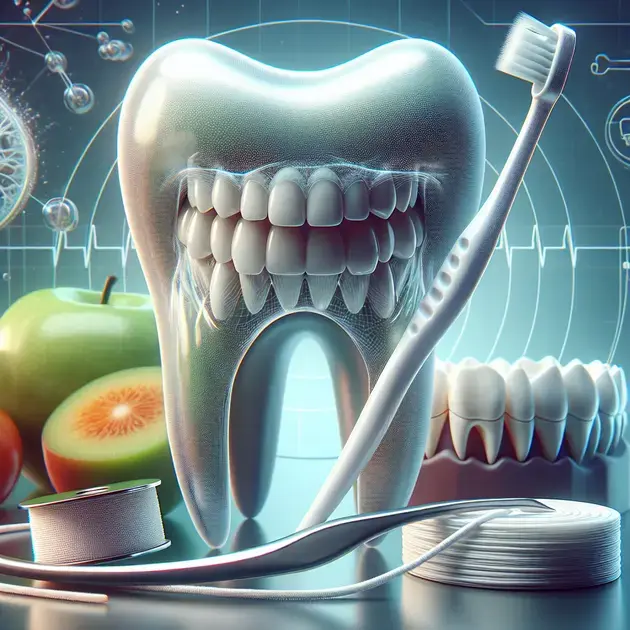Dental plaque is a common issue that affects many people around the world. Understanding and preventing dental plaque on teeth is crucial for maintaining good oral health. According to recent studies, dental plaque is a biofilm made up of bacteria that can lead to tooth decay and gum disease if not properly managed.
By learning more about the causes of dental plaque and implementing preventive measures, individuals can effectively protect their teeth and gums. Regular brushing, flossing, and dental check-ups are essential in the fight against plaque buildup. Stay tuned as we explore in detail the best ways to understand and prevent dental plaque on teeth.

Understanding the Basics of Dental Plaque
Dental plaque is a sticky, colorless film of bacteria that constantly forms on our teeth. It is the main cause of tooth decay and gum disease. Understanding the basics of dental plaque is crucial in maintaining good oral hygiene. Plaque develops when bacteria feed on sugars from the food we eat, producing acids that can erode tooth enamel.
To effectively understand dental plaque, it’s important to recognize the signs of its presence. These signs include a fuzzy feeling on the teeth, bad breath, and the formation of a yellowish layer on the teeth. Regular dental check-ups and cleanings are essential to remove plaque build-up and prevent potential dental issues.
One effective way to visualize dental plaque is by using disclosing tablets, which contain a dye that colors the plaque on your teeth. This visual aid can help you identify areas where plaque tends to accumulate, enabling you to target these spots during your oral care routine.
Brushing your teeth at least twice a day and flossing daily are fundamental steps in combating dental plaque. Using fluoride toothpaste and antimicrobial mouthwash can also help in reducing plaque formation and maintaining a healthy mouth.
In addition to regular oral care practices, maintaining a balanced diet low in sugary and acidic foods can minimize bacterial growth and plaque formation. Drinking plenty of water throughout the day can also help rinse away food particles and reduce plaque build-up.
Key Factors Contributing to Plaque Formation
Several key factors contribute to the formation of dental plaque. Poor oral hygiene is one of the primary factors, as neglecting regular brushing and flossing allows plaque to accumulate on the teeth. Consuming a diet high in sugars and carbohydrates fuels bacterial growth, leading to increased plaque formation.
The presence of certain risk factors, such as dry mouth or a history of gum disease, can make individuals more prone to plaque build-up. Saliva plays a crucial role in washing away food particles and bacteria, so conditions that decrease saliva production can exacerbate plaque formation.
Smoking and tobacco use not only stain the teeth but also contribute to plaque development. Nicotine and other chemicals in tobacco products can hinder saliva production and promote the adherence of bacteria to the teeth, leading to plaque accumulation.
Genetics can also play a role in determining an individual’s susceptibility to plaque formation. Some people may have a genetic predisposition to increased plaque build-up, making it essential for them to be vigilant in their oral hygiene practices.
Understanding these key factors contributing to plaque formation is essential in implementing effective strategies to prevent and control its build-up, promoting optimal oral health.
Effective Strategies for Preventing Dental Plaque
Preventing dental plaque is crucial in maintaining good oral health and preventing oral diseases. Adopting effective strategies can help in minimizing plaque formation and reducing the risk of dental issues. Establishing a consistent oral care routine is the foundation of preventing plaque build-up.
Brushing your teeth at least twice a day with a fluoride toothpaste is essential in removing plaque and bacteria from the tooth surfaces. Use a soft-bristled toothbrush and gentle, circular motions to effectively clean all areas of your teeth and gums.
Flossing daily is equally important in reaching areas between the teeth where a toothbrush cannot access. Dental floss helps remove food particles and plaque from tight spaces, preventing their accumulation and potential damage to the teeth.
Regular dental check-ups and cleanings are vital in detecting early signs of plaque build-up and addressing them before they lead to more serious dental problems. Professional cleanings can remove hardened plaque, known as tartar, which cannot be removed through regular brushing and flossing.
Using antimicrobial mouthwash can complement your oral hygiene routine by reducing the amount of bacteria in your mouth and freshening your breath. Mouthwash can reach areas that are difficult to clean with a toothbrush or floss, providing additional protection against plaque formation.
Adopting a healthy lifestyle that includes a balanced diet and refraining from tobacco use can further contribute to preventing dental plaque. Limiting sugary and acidic foods can help minimize bacterial growth, while staying hydrated by drinking water can promote saliva production to naturally cleanse the mouth.

**Understanding the Importance of Oral Hygiene**
Oral hygiene is crucial for maintaining optimal dental health. Brushing and flossing regularly help remove plaque, a sticky film of bacteria that forms on teeth. Poor oral hygiene can lead to various dental issues, such as cavities, gum disease, and bad breath. By practicing good oral hygiene habits, individuals can prevent these problems and maintain a healthy smile.
Plaque is a major concern when it comes to oral hygiene. If not removed through proper brushing and flossing, it can harden into tartar, which can only be removed by a dentist. Tartar buildup can lead to gum disease and other serious oral health issues. Regular dental check-ups and cleanings are essential in ensuring that any plaque or tartar buildup is addressed promptly.
In addition to brushing and flossing, a balanced diet plays a significant role in oral hygiene. Avoiding sugary and acidic foods can help prevent plaque formation and tooth decay. Consuming a diet rich in fruits, vegetables, and dairy products can promote healthy teeth and gums. Drinking plenty of water throughout the day also helps wash away food particles and bacteria, reducing the risk of plaque buildup.
Practicing good oral hygiene not only benefits the teeth and gums but also contributes to overall health. Research has shown a link between poor oral health and various systemic conditions, such as heart disease and diabetes. By prioritizing oral hygiene, individuals can lower their risk of developing these health issues and improve their quality of life.
**How Diet Affects Dental Plaque Accumulation**
The food we consume plays a significant role in dental plaque accumulation. Sugary and starchy foods can feed the bacteria in the mouth, leading to the production of acids that attack tooth enamel. Frequent consumption of these foods increases the risk of plaque formation, which can eventually lead to cavities and gum disease.
In contrast, a diet rich in fibers, fruits, and vegetables can help control plaque accumulation. Crunchy fruits and vegetables, such as apples and carrots, act as natural toothbrushes, helping to clean the teeth and stimulate saliva production. Saliva plays a crucial role in neutralizing acids and protecting the teeth from plaque buildup.
Furthermore, dairy products like cheese and yogurt are rich in calcium and phosphates, which strengthen tooth enamel and reduce the risk of plaque formation. Incorporating these foods into your diet can help promote better oral health and prevent dental issues.
It’s essential to be mindful of what you eat and maintain a balanced diet to support good oral hygiene. Limiting sugary snacks and beverages, and opting for tooth-friendly foods can go a long way in reducing plaque accumulation and maintaining a healthy smile. Coupled with regular brushing and flossing, a nutritious diet can significantly impact your dental health.
**The Role of Fluoride in Fighting Plaque Growth**
Fluoride is a mineral that plays a crucial role in fighting plaque growth and strengthening tooth enamel. It helps prevent tooth decay by remineralizing the enamel and making it more resistant to acid attacks from plaque bacteria. Fluoride is commonly found in toothpaste, mouthwash, and tap water, and its use is supported by dental professionals worldwide.
Using fluoride toothpaste twice a day can significantly reduce plaque buildup and protect the teeth from decay. Fluoride works by inhibiting the demineralization process and promoting the remineralization of weakened enamel. This process helps reverse early signs of tooth decay and prevents the development of cavities.
Fluoride treatments provided by dentists are also beneficial in strengthening the teeth and preventing plaque formation. These treatments are particularly helpful for individuals at high risk of cavities or those with weakened enamel. Dentists may recommend fluoride varnishes or rinses to provide additional protection against plaque and tooth decay.
In communities where fluoride is added to the water supply, residents benefit from improved dental health outcomes. Water fluoridation has been shown to reduce the incidence of cavities and improve overall oral health in populations. By supporting the incorporation of fluoride into oral care routines, individuals can effectively combat plaque growth and maintain strong, healthy teeth.
Conclusion
Understanding the importance of oral hygiene is essential for maintaining optimal dental health and preventing various dental issues. Regular brushing and flossing help remove plaque, a sticky film of bacteria that can lead to cavities, gum disease, and bad breath. By practicing good oral hygiene habits and incorporating a balanced diet rich in fruits, vegetables, and dairy products, individuals can promote healthy teeth and gums while reducing the risk of plaque buildup. Additionally, staying hydrated by drinking plenty of water throughout the day can further aid in washing away food particles and bacteria.
Moreover, the impact of diet on dental plaque accumulation highlights the significance of making tooth-friendly food choices. Avoiding sugary and starchy foods that can feed bacteria and lead to acid production is crucial in preventing plaque formation. Instead, opting for fiber-rich foods, such as crunchy fruits and vegetables like apples and carrots, can act as natural toothbrushes, helping to clean teeth and stimulate saliva production. Dairy products like cheese and yogurt, rich in calcium and phosphates, can strengthen enamel and reduce the risk of plaque buildup.
Lastly, the role of fluoride in fighting plaque growth cannot be overstated. Fluoride, found in toothpaste, mouthwash, and tap water, plays a critical role in remineralizing enamel and making it more resistant to acid attacks. By using fluoride toothpaste regularly and considering fluoride treatments recommended by dentists, individuals can significantly reduce plaque buildup, prevent tooth decay, and maintain strong, healthy teeth. Supporting the incorporation of fluoride into oral care routines, especially in communities with water fluoridation, can lead to improved dental health outcomes and a reduced incidence of cavities, enhancing overall oral health and well-being.